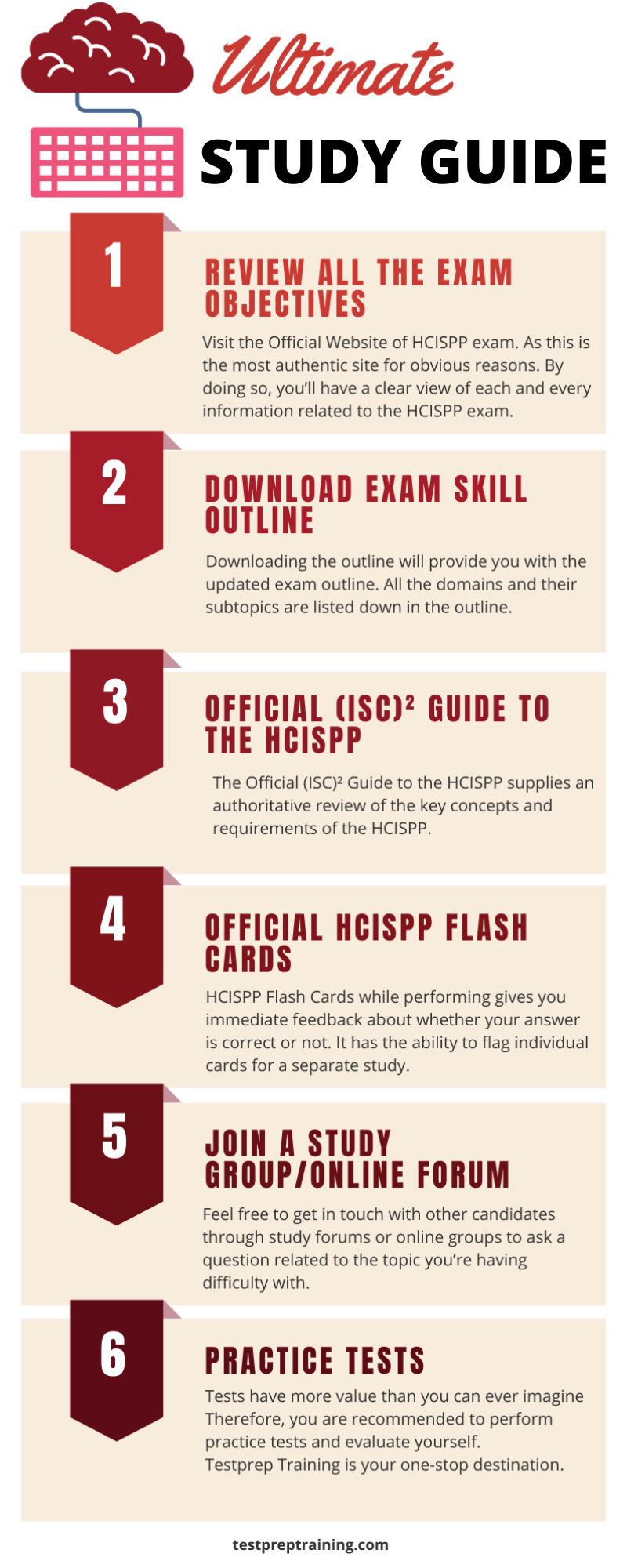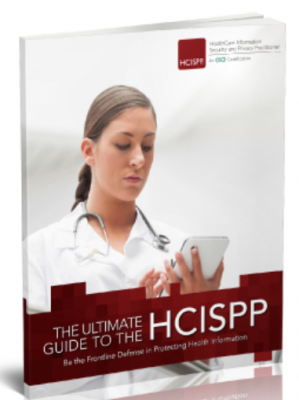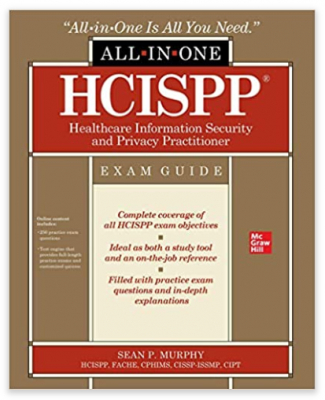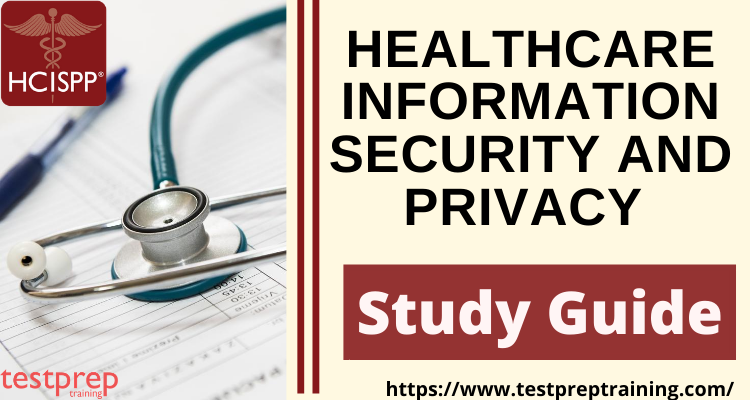The HCISPP certification validates an individual’s knowledge and skills in the areas of healthcare industry regulations, privacy and security best practices, risk management, and incident response. The exam includes subjects like controlling access, safeguarding networks, protecting data privacy, and complying with regulations such as HIPAA, HITECH, and the Affordable Care Act.
The certification is intended for a wide range of healthcare industry professionals, including security managers, compliance officers, privacy officers, IT managers, and consultants. This certification is known worldwide and shows that someone is dedicated to keeping healthcare information safe and private.
HCISPP: HealthCare Information Security and Privacy: Glossary
Here are some key terms and concepts related to HCISPP:
- Protected Health Information (PHI) – PHI is any health information about a specific person that is made, received, or kept by a healthcare organization or its business partners.
- Health Insurance Portability and Accountability Act (HIPAA) – HIPAA is a United States federal law that creates rules for keeping PHI private and secure.
- Health Information Technology for Economic and Clinical Health Act (HITECH) – HITECH is a United States federal law that encourages the use of electronic health records and makes the privacy and security rules of HIPAA stronger.
- Risk Management – The process of identifying, assessing, and prioritizing potential risks to an organization’s information assets and developing strategies to mitigate those risks.
- Incident Response – The process of responding to and managing security incidents, such as data breaches or cyber attacks.
- Access Control – Securing information or systems to make sure only the right people can access them is called access control.
- Network Security – The practice of securing computer networks from unauthorized access, theft, or damage.
- Data Privacy – The protection of sensitive information from unauthorized access, use, or disclosure.
- Business Associate Agreement (BAA) – A legal agreement between a healthcare organization and another company that explains what each of them should do when dealing with sensitive health information is called a business associate agreement.
- Security Risk Assessment – An evaluation of an organization’s security posture, including its systems, policies, and procedures, to identify vulnerabilities and potential threats to its information assets.
HCISPP: HealthCare Information Security and Privacy: Exam Guide
Here are some resources to help you prepare for the HCISPP exam:
- (ISC)² HCISPP Certification Page – This is the official certification page for the HCISPP program. It provides an overview of the certification, its benefits, and the exam format.
Link: https://www.isc2.org/Certifications/HCISPP
- HCISPP Exam Outline – This document provides a detailed outline of the topics covered on the HCISPP exam.
Link: https://www.isc2.org/-/media/ISC2/Certifications/Exam-Outlines/HCISPP-Exam-Outline.ashx
- HCISPP Exam Study Guide – This is a comprehensive study guide for the HCISPP exam, developed by (ISC)².
Link: https://www.isc2.org/-/media/ISC2/Certifications/Exam-Outlines/HCISPP-Study-Guide.ashx
4. HCISPP All-In-One Exam Guide – This is a comprehensive exam guide for the HCISPP exam, written by a team of information security experts.
Link: https://www.mhprofessional.com/9780071831799-usa-hcispp-certification-all-in-one-exam-guide
5. Healthcare Information Security and Privacy – This is a comprehensive textbook on healthcare information security and privacy, which covers many of the topics that are covered on the HCISPP exam.
Link: https://www.amazon.com/Healthcare-Information-Security-Privacy-Khosrowpour/dp/1522504321
- Healthcare Information Security and Privacy Certification – This is an online course that provides comprehensive training on healthcare information security and privacy, specifically designed to help prepare individuals for the HCISPP exam.
Link: https://www.cybrary.it/course/healthcare-information-security-and-privacy-certification/
HCISPP: HealthCare Information Security and Privacy Exam Tips and Tricks
Here are some tips and tricks to help you prepare for the HCISPP exam:
- Understand the exam format – The HCISPP exam consists of 125 multiple-choice questions, and you will have three hours to complete it. Make sure you understand the format of the exam before you begin studying.
- Review the exam outline – The exam outline gives you a clear list of what the exam will ask about. Make sure you understand each topic on the list.
- Focus on healthcare industry regulations – A significant portion of the HCISPP exam covers healthcare industry regulations, such as HIPAA and HITECH. Make sure you have a strong understanding of these regulations and how they apply to healthcare information security and privacy.
- Practice your risk management skills – Risk management is a critical component of healthcare information security and privacy. Practice your risk management skills by working through real-world scenarios and developing risk management plans.
- Use practice tests and study guides – Practice tests and study guides are valuable tools for getting ready for the HCISPP exam. They can help you figure out where you might need more study and give you an idea of the kinds of questions that will appear on the test.
- Attend training courses – There are many training courses available that are specifically designed to help individuals prepare for the HCISPP exam. Consider attending one of these courses to get hands-on experience with healthcare information security and privacy concepts.
- Join a study group – Studying with a group can help you stay motivated and on track with your studying. Join a study group of other HCISPP candidates to share ideas, ask questions, and offer support to one another.
Remember to take breaks and give yourself plenty of time to prepare for the exam. With the right study materials and a solid understanding of the exam format, you can pass the HCISPP exam and earn your certification.
HCISSP Exam Study Guide
When you’re working toward your goal and aiming for success, it’s important to have helpful preparation resources. The resources mentioned here will help you build a solid foundation for the exam, increasing your chances of achieving your desired results. If you’re aiming for a perfect score, the HCISPP Exam Preparation resources listed below are everything you need to pass the HCISPP exam. Let’s begin with the HCISPP Exam Guide.

Step 1 – Review all the HCISPP Exam Objectives
Your first step in the study guide is to review all the exam objectives. And, to do so, make sure to visit the Official Website of HCISPP exam. As this is the most authentic site for obvious reasons. By doing so, you’ll have a clear view of each and every information related to the HCISPP exam. So, make sure, you understand all about the exam policies before commencing on with your preparations.
Step 2- Download HCISPP Exam skill Outline
Secondly, you must download the exam skill outline available on the official website itself. Downloading the HCISPP Exam Outline will provide you with the updated exam outline. All the domains and their subtopics are listed down in the outline. Keep in mind not to rely on any other website except the official website itself. Since the exam is updated after every few years hence the official website is your door to reliable information. Familiarising yourself with the exam course is indeed important to have clarity about the concepts. This exam covers the following 7 domains:
Domain 1. Healthcare Industry
This domain covers the topics like Understand the Healthcare Environment Components, Understand Third-Party Relationships and Understand Foundational Health Data Management Concepts.
Domain 2. Information Governance in Healthcare
This domain aims at equipping you with the skills to understand Information Governance Frameworks and Identify Information Governance Roles and Responsibilities. Also, Align Information Security and Privacy Policies, Standards and Procedures. Further, understand and comply with Code of Conduct/Ethics in a Healthcare Information Environment
Domain 3. Information Technologies in Healthcare
Further this domain includes understanding the Impact of Healthcare Information Technologies on Privacy and Security. Also, understand Data Life Cycle Management and Third-Party Connectivity.
Domain 4. Regulatory and Standards Environment
This domain aims at the concepts to identify Regulatory Requirements, Recognize Regulations and Controls of Various Countries. Moreover, understand Compliance Frameworks
Domain 5. Privacy and Security in Healthcare
Subsequently, in this domain topics covered are understand Security Objectives/Attributes Understand General Security Definitions and Concepts. Also, understand General Privacy Definitions and Concepts. Further, understand the Relationship Between Privacy and Security Understand Sensitive Data and Handling.
Domain 6. Risk Management and Risk Assessment
This domain focuses on understanding Enterprise Risk Management and Information Risk Management Framework (RMF). Also, understand Risk Management Process, identify Control Assessment Procedures and Utilizing Organization Risk Frameworks. Further, participate in Risk Assessment Consistent with the Role in Organization and understand Risk Response. Not to mention, Utilize Controls to Remediate Risk Participate in Continuous Monitoring.
Domain 7. Third-Party Risk Management
Lastly, this domain covers concepts to understand the Definition of Third-Parties in Healthcare Context, maintain a List of Third-Party Organizations, apply Management Standards and Practices for Engaging Third-Parties. Also, determine when a Third-Party Assessment is required, support Third-Party Assessments and Audits, Participate in Third-Party Remediation Efforts. Also,respond to Notifications of Security/Privacy Events, respond to Third-Party Requests Regarding Privacy/Security Events and promote awareness of Third-Party Requirements.
Step 3- Refer Official (ISC)² Guide to the HCISPP
The Official (ISC)² Guide to the HCISPP is a trusted resource that provides a comprehensive overview of the important ideas and criteria for the HCISPP exam. This guide includes all the essential knowledge areas needed to show your expertise in healthcare security and privacy. It covers all seven domains, beginning with the Healthcare Industry and extending to Third Party Risk Management.
Step 4- Explore Learning Resources
Official HCISPP Flash Cards
With Official CCSP Flash Cards, CCSP aspirants can study anytime and anywhere for their exam. Likewise, HCISPPI Flash Cards allows the candidates to study anytime and anywhere. HCISPP Flash Cards while performing gives you immediate feedback about whether your answer is correct or not. It has the ability to flag individual cards for a separate study. Remember, these cards are sectioned for each domain to make learning easier.
Books to consider


Books are a valuable way to learn and expand your knowledge. So don’t restrict your learning. We strongly suggest the following resources:
- HCISPP HealthCare Information Security and Privacy Practitioner All-in-One Exam Guide by Sean Murphy
- Official (ISC)2 Guide to the HCISPP CBK by Steven Hernandez.
Step 5 – Join a Study Group/Online Forum
Online forums and study groups can be really helpful when getting ready for the HCISPP exam. You can connect with other candidates through these forums and groups, and ask questions about topics you find challenging. Joining them is your choice, and it’s a flexible option. These online communities also keep you in touch with others on the same journey as you, and you can seek help for any challenging topics.
Step 6 – Attempt HCISPP Practice Tests
In today’s digital age, practice tests have moved online, which means you can take them from the comfort of your home. These tests are incredibly valuable, so it’s a good idea to take HCISPP Practice Exams to assess your knowledge. They offer an excellent chance for learning and improving your scores. So, try out several practice tests to increase your confidence. Lets Start Practising Now!



